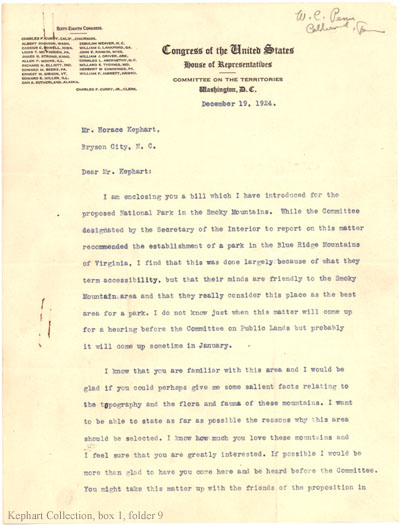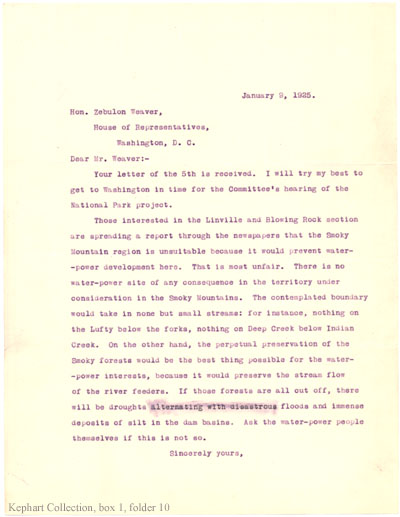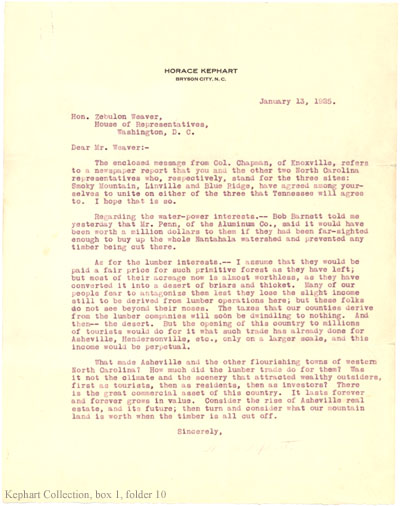Online
Exhibit: Great Smoky Mountains: National
Park Campaign |
|
| Despite
a stereotype of Appalachia that often
continues today, neither the history
nor the culture of western North Carolina
has been stagnant. Kephart arrived
at a critical period of change for
the region. Railroads had pierced
the mountains of western North Carolina
in the 1880s alongside large scale
industrial development, especially
in the logging and mining industries.
And by 1900 business leaders were
moving to further capitalize on the
long-standing tourist industry. As
he became more involved in the economic
and political future of the region,
the idea of placing a National Park
in western North Carolina emerged
among tremendous controversy. Several
areas were competing for the federal
investment. And the companies and
communities residing in the proposed
park area were understandably opposed.
Kephart became instrumental in guiding
the planning process through the controversy
and into creation. His combination
of reputation and literary skills
supported many aspects of the movement
to create a National Park in the Great
Smoky Mountains through personal letters
to public officials and published
writings. As a unique and recognized
personification concerning cultural
and natural studies in the region,
he was influential in convincing individuals
on both a local and national level
to support the park. Kephart's arguments
for the park were thoughtful and pragmatic
as well as appealing to a love of
nature, and an opportunity for man
to return to a more natural and healthy
state. Suggesting that the Great Smoky
Mountains contributed to his mental
and physical recovery after 1904,
he campaigned vigorously to preserve
the last major stands of forests in
the East. Working for the Swain County
Chamber of Commerce, he also carefully
noted the economic potential of the
proposed park and related tourism. |
| 

|
December
19, 1924.
Mr. Horace Kephart,
Bryson City, N. C.
Dear Mr. Kephart,
I am enclosing you a bill which
I have introduced for the proposed
National Park in the Smoky Mountains.
While the Committee designated by
the Secretary of the Interior to report
on this matter recommended the establishment
in the Blue Ridge Mountains of Virginia,
I find that this was done largely
because of what they term accessibility,
but that their minds are friendly
to the Smoky Mountains area and that
they really consider this place as
the best area for a park. I do not
know just when this matter will come
up for a hearing before the Committee
on Public Lands but probably it will
come up sometime in January.
I know that you are familiar with
the area and I would be glad if you
could perhaps give me some sallent
facts relating to the topography and
the flora and fauna of these mountains.
I want to be able to state as far
as possible the reasons why this area
should be selected. I know how much
you love these mountains and I feel
sure that you are greatly interested.
If possible I would be more than glad
to have you come here and be heard
before the Committee. You might take
this matter up with the friends of
the proposition in your section and
advise me fully as to their desires.
With my sincere personal esteem,
I am,
Sincerely yours,
Zebulon Weaver |
|

|
January 9, 1925
Hon. Zebulon Weaver
House of Representatives,
Washington, D.C.
Dear. Mr. Weaver:-
Your letter of the 5th is received.
I will try my best to get to Washington
in time for the Committee's hearing
of the National Park project.
Those interested in the Linville
and Blowing Rock section are spreading
a report through newspapers that the
Smoky Mountain region is unsuitable
because it would prevent water-power
development here. That is most unfair.
There is no waterpower site of an
consequence in the territory under
consideration in the Smoky Mountains.
The contemplated boundary would take
in none but small streams: for instance,
nothing on the Lufty below the forks,
nothing on Deep Creek below Indian
Creek. On the other hand, the perpetual
preservation of the Smoky forests
would be the best thing possible for
the waterpower interests, because
it would preserve the stream flow
of the river feeders. If those forests
are all cut off, there will be droughts
alternating with disastrous floods
and immense deposits of silt in the
dam basins. Ask the waterpower people
themselves if this is not so.
Sincerely yours, |
|

|
January 13, 1925.
Hon. Zebulon Weaver,
House of Representatives,
Washington, D. C.
Dear Mr. Weaver:-
The enclosed message from Col.
Chapman, of Knoxville, refers to a
newspaper report that you and the
other two North Carolina representatives
who, respectively, stand for the three
sites: Smoky Mountain, Linville and
Blue Ridge, have agreed among yourselves
to unite on either of the three that
Tennessee will agree to. I hope that
is so.
Regarding the waterpower interests.--
Bob Barnett told me yesterday that
Mr. Penn, of the Aluminum Co., said
it would have been worth a million
dollars to them if they had been far
sighted enough to buy up the whole
Nantahala watershed and prevented
any timber being cut there.
As far the lumber interests:--
I assume that they would be paid a
fair price for such primitive forest
as they have left; but most of their
acreage now is almost worthless, as
they have converted it into a desert
of briars and thicket. Many of our
people fear to antagonize them lest
they lose the slight income still
derived from lumber operations here;
but these folks do not see beyond
their noses. The taxes that our counties
derive from the lumber companies will
soon be dwindling to nothing. And
then-- the desert. But the opening
of the country to millions of tourists
would do for it what much trade has
already done for Asheville, Hendersonville,
etc., only on a larger scale, and
this income would be perpetual.
What made Asheville and the other
flourishing towns of western North
Carolina? How much did the lumber
trade do for them? Was is not the
climate and the scenery that attracted
wealthy outsiders, first as tourists,
then as residents, then as investors?
There is a great commercial asset
of this country. It lasts forever
and forever grows in value. Consider
the rise of Asheville real estate,
and its future; then turn and consider
what our mountain land is worth when
the timber is all cut off.
Sincerely, |
 |
|
|
|
|
|
|
|